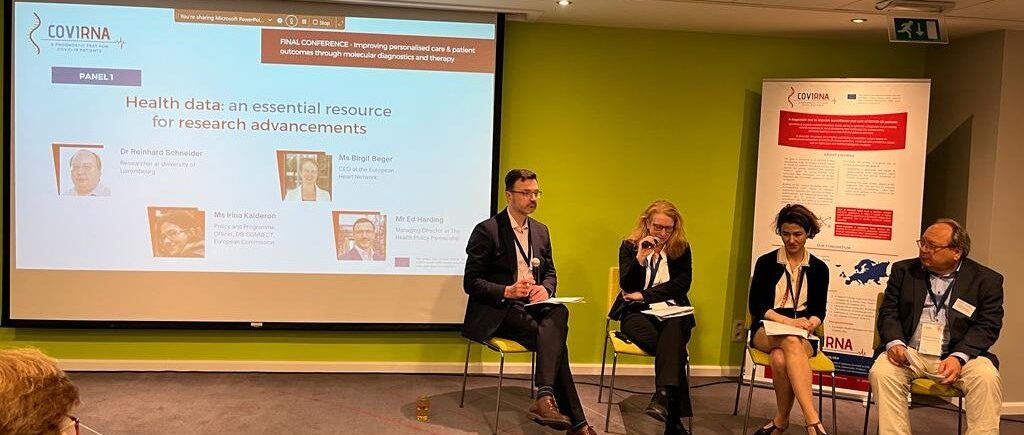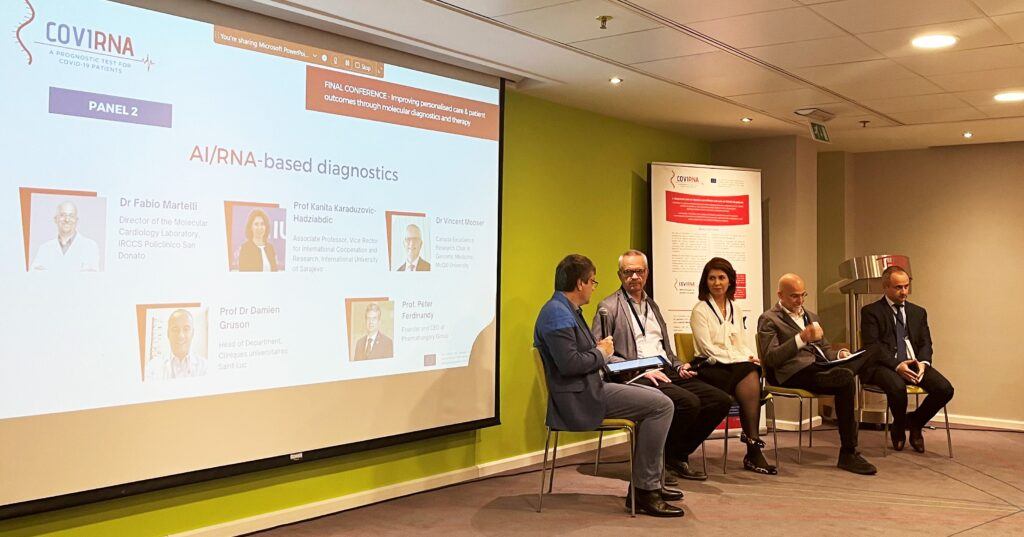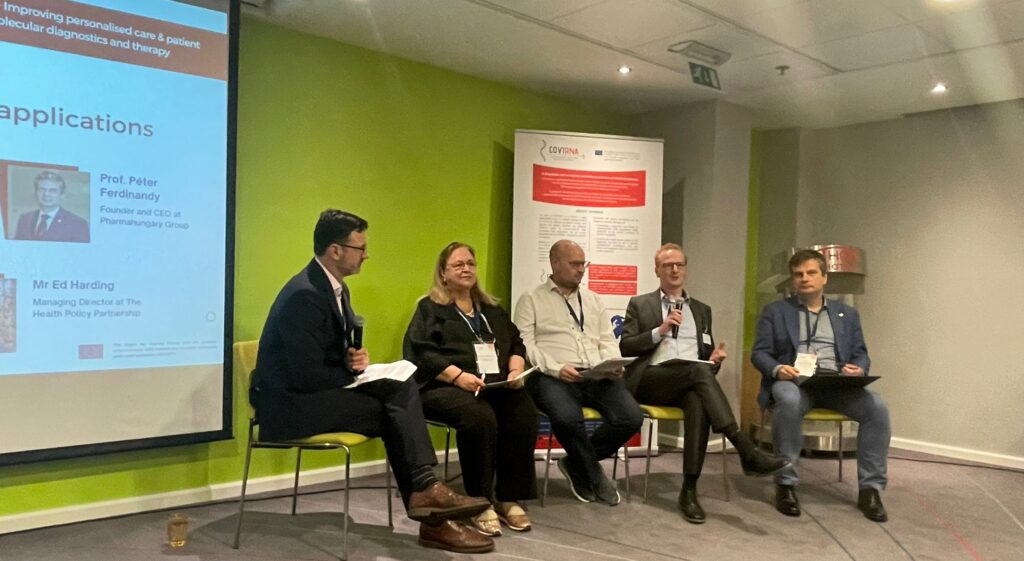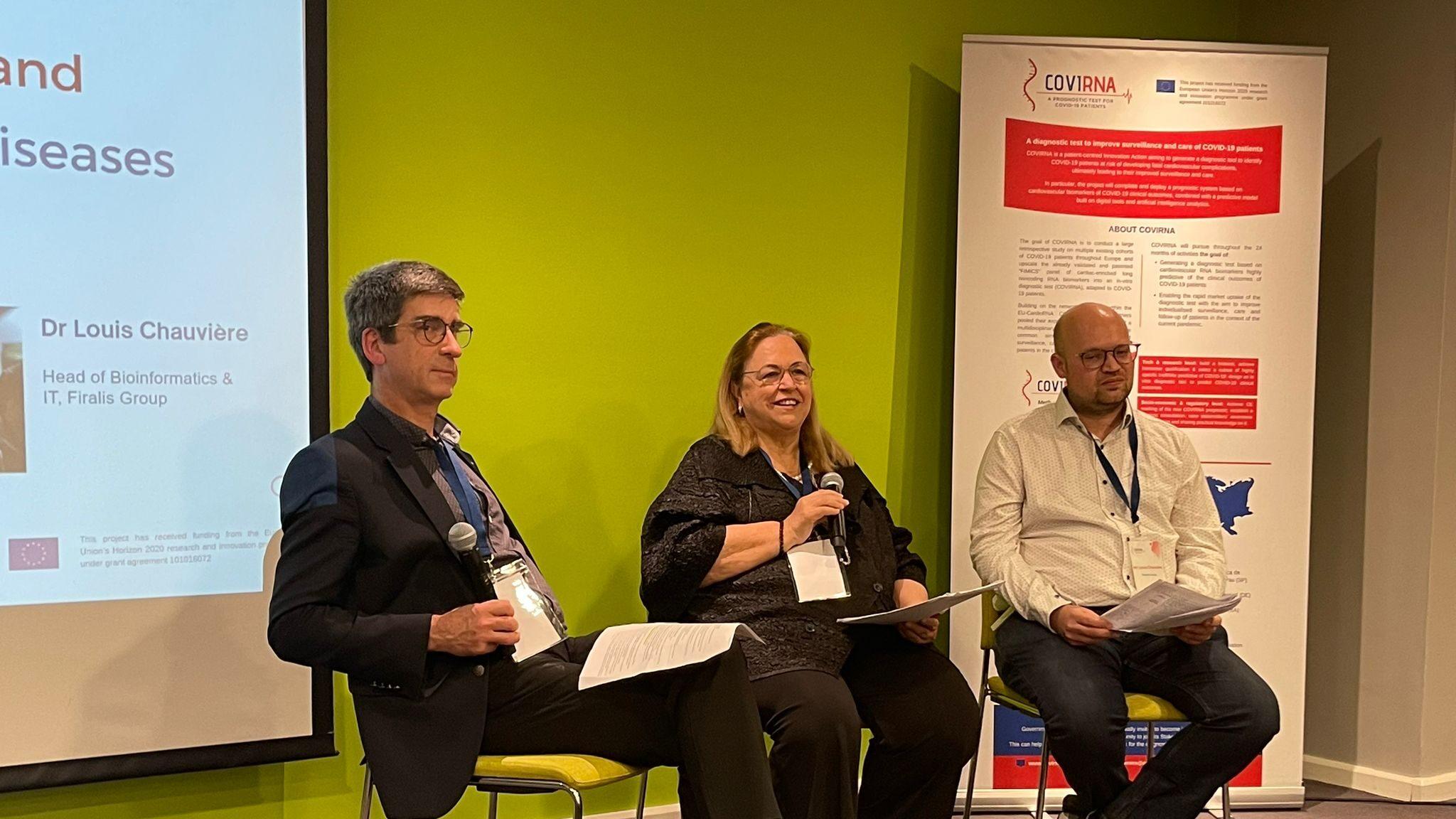The COVIRNA project concludes with its final conference
Even though the acute phase of the pandemic is over, COVID-19 is not. The disease causes long term sequelae in patients, which have been grouped under the term long-COVID. It is therefore important to continue working on finding solutions for these complications, in order to offer personalised, patient-centred care, leading to slighter sequelae and better patient outcomes. The molecular diagnostic tool that will be developed as a result of the COVIRNA project will help clinicians achieve this objective.
On 19 April 2023, the COVIRNA project held its final conference ‘Improving personalised care and patient outcomes through molecular diagnostics and therapy‘ in Brussels, Belgium. The five panels brought together COVIRNA consortium members, European Commission representatives, medical doctors, patient organisation representatives, as well as other experts in the field. Each panel discussed a different topic, starting from the European context of EU-funded projects to the COVIRNA toolkit’s benefits and applications, and how to move molecular research forward.
Research and innovation in the EU: COVIRNA in the context of EU-funded projects
– Dr Fergal Donnelly, Principal Investigator, DG RTD, European Commission, Belgium
– Ms Irina Kalderon, Policy and Programme Officer, DG CONNECT, European Commission, Luxembourg
facilitated by Dr Yvan Devaux, COVIRNA Project Coordinator and Head of Cardiovascular Research Unit at Luxembourg Institute of Health, Luxembourg
Among the European Commission’s priorities is the digital revolution. This means harvesting real world data and evidence from clinical trials and patient experiences, and standardising this information in a way that becomes a reality, which is reflected in the COVIRNA project. This was however difficult to achieve during the pandemic. One of the challenges that was faced by all the projects financed to identify solutions to the COVID pandemic was that the time allocated to develop and accelerate solutions was very short. Nevertheless, these types of projects have brought data sustainability to light. Data should be standardised, allowing for the rapid construction of disease models. This will also enable data to be interoperable and inter-exchangeable among countries and studies.
Health data: an essential resource for research advancements
– Prof Reinhard Schneider, Head of bioinformatics core facility, University of Luxembourg, Luxembourg
– Ms Irina Kalderon, Policy and Programme Officer, DG CONNECT, European Commission, Luxembourg
– Ms Birgit Beger, CEO, European Heart Network, Belgium
facilitated by Mr Ed Harding, Managing Director of The Health Policy Partnership, United Kingdom
Big data is an essential component for new developments and clinical science. It is also central to improve the lives of patients and predict disease evolutions. To achieve these objectives, data needs to be curated and standardised, making it comparable between sources. This will make data sustainable and allow for its secondary use, as promoted by the FAIR principles. The European Health Data Space will be a facilitating platform for the interoperability and accessibility of data.
The pandemic has highlighted the importance of data sharing tools, but has also shed light on the need to take into consideration the questions of data privacy and ethics when using them. Steps are already being taken in this direction, such as the encryption of transferred data that was applied in the COVIRNA project. Putting standardised legal frameworks in place for the use and transfer of data will allow for great time gain in cases of emergency access to data.
Another obstacle that should be overcome is patient consent. Health literacy is very important in this matter. Citizens should be educated in order for them to trust what is being implemented to preserve the privacy of their data. Patient involvement in the research is also critical. It will be an opportunity for them to have an input on the use of their data, thus creating trust and lowering barriers. All of these efforts that have been made during the pandemic and in the COVIRNA project should be maintained, so as not to reinvent the wheel in future pandemics or emergency situations.

AI/RNA-based diagnostics
– Dr Fabio Martelli, Director of the Molecular Cardiology Laboratory, IRCCS Policlinico San Donato, Italy
– Prof Kanita Karaduzovic-Hadziabdic, Associate Professor, Vice Rector for International Cooperation and Research, International University of Sarajevo
– Dr Vincent Mooser, Canada Excellence Research Chair in Genomic Medicine, McGill University, Canada
– Prof Dr Damien Gruson, Head of Department, Cliniques universitaires Saint-Luc Brussels, Belgium
facilitated by Prof Péter Ferdinandy, Founder and CEO, Pharmahungary Group, Budapest, Hungary
Many factors have contributed to the choice of Ribonucleic acid (RNA) as a biomarker in the COVIRNA project. It is a molecule that contains a great amount of information about the body. It is also measurable and accessible.
Artificial Intelligence (AI) serves to analyse the data collected through the RNA. It is a technological advance that is well suited to analyse big data, including complex research biomedical data. Having an increasing amount of biological data will then facilitate the transformation of the healthcare system, making AI an assisting tool to improve the diagnosis and prognosis of patients, leading to a personalised approach in their care. Using these technologies, in combination with RNA-based diagnostics, will provide several other benefits. They can offer sustainable treatments, by helping to prevent disease evolution and the development of complications, and they can lead to smart efficient processes, resulting in better designs of clinical pathways. These benefits can support the shortage of healthcare professionals. Four elements are necessary for the development of AI technologies: definition of the need, structured data, competent individuals, and ethical liability. AI has already shown a potential added value in cardiovascular disease, for instance for the diagnosis of heart attacks with an improved identification of early signals on electrocardiograms. However, the use of AI is still mostly limited to research because of the need for extensive clinical and ethical validation before implementation in clinics.

The COVIRNA toolkit: benefits and applications
– Dr Louis Chauvière, Head of Bioinformatics & IT, Firalis Group, France
– Dr Timo Brandenburger, University Hospital Düsseldorf, Germany
– Prof Lina Badimon, Director of the Cardiovascular Program (ICCC) – IR Hospital de la Santa Crue I Sant Pau, Spain
– Prof Péter Ferdinandy, Founder and CEO, Pharmahungary Group, Budapest, Hungary
facilitated by Mr Ed Harding, Managing Director, The Health Policy Partnership, United Kingdom
The COVIRNA toolkit will allow the measurement of RNA, which will then facilitate the prediction of adverse outcomes (mainly cardiovascular) in COVID-19 patients. This step would be taken as soon as the COVID-19 diagnosis is confirmed, in order to assess the risk of developing complications. Patients prone to develop complications would receive tailored healthcare to reduce the risk of developing sequelae and long COVID symptoms. Patient-centred approaches and personalised medicine are indeed the healthcare of the future, and the COVIRNA toolkit serves to put this approach into place, especially considering the unpredictability of disease evolution in COVID-19.
A notable aspect of this toolkit is that the diagnosis methodology replicates that of the COVID-19 PCR diagnosis tests, thus the testing tools are already in place in most hospitals, facilitating the adoption of this technology. Another essential characteristic of this toolkit is that there is unlimited potential for its application. AI and the developed technology can be used to combine several biomarkers, which will be useful for other disease areas.

Moving forward: leveraging research and technologies to address cardiovascular diseases
– Prof Lina Badimon, Director of the Cardiovascular Program (ICCC) – IR Hospital de la Santa Crue I Sant Pau, Spain
– Dr Louis Chauvière, Head of Bioinformatics & IT, Firalis Group, France
facilitated by Dr Yvan Devaux, COVIRNA Project Coordinator and Head of Cardiovascular Research Unit at Luxembourg Institute of Health, Luxembourg
Generating strong data is an important condition for translating the research into clinical practice, because clinicians want to offer their patients the best treatments. Communication should therefore also be at the centre of the efforts, to create engagement among the stakeholders. The disseminated information should not only contain scientific information, but it is essential to include the clinical application and clinical use of the developed research as well. Advocating for the complexity of the multifactorial cardiovascular diseases and on the central role of the cardiovascular system in health is also crucial to translate the importance of finding solutions for this type of disease.

